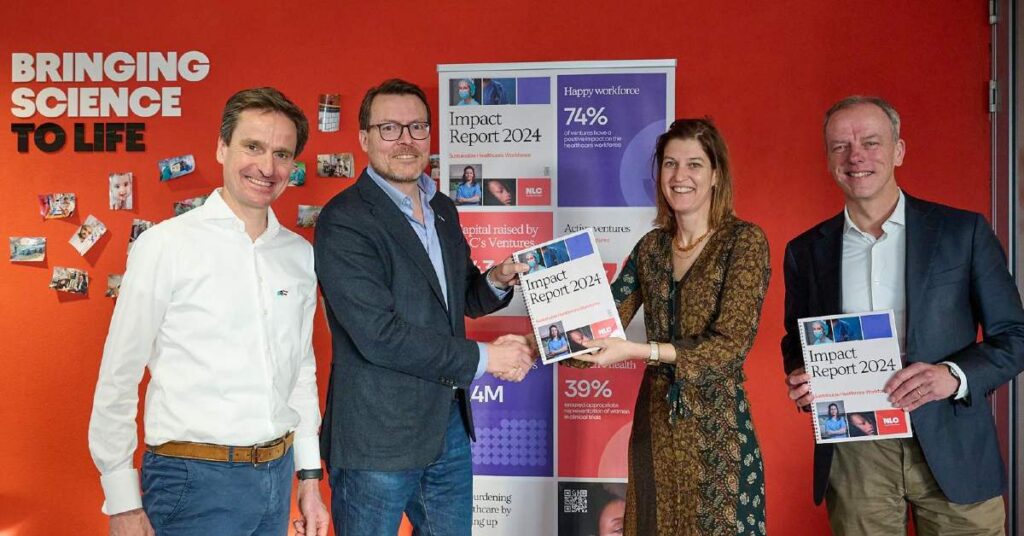Amsterdam-based NLC Health Ventures, a healthtech venture builder and early-stage investor, announced the launch of its third annual Impact Report.
This year’s report focuses on supporting the healthcare workforce, expanding patient access, and accelerating the adoption of breakthrough medical innovations.
“Healthcare is about people first. Technology is a tool to support them, not replace them. Through our ventures and partnerships, we’re driving innovation that makes care more efficient, accessible, and patient-centered,” says Bert-Arjan Millenaar, CEO and Founder of NLC Health Ventures.
Here are the key takeaways:
Co-founded 20 new ventures
In 2024, NLC Health Ventures co-founded 20 new ventures (10 in medtech and 10 in biotech) by selecting innovations with strong potential to connect science and the market.
The team evaluated over 1,500 technologies from more than 40 countries, setting the stage for future projects. They aim to focus on healthcare innovations that can make a real difference.
Of the technologies assessed, 79 per cent originated from physicians and researchers at universities or medical centers, 6 per cent came from corporate R&D, and 15 per cent were from independent developers.
Many innovators faced challenges such as limited market knowledge and a lack of entrepreneurial skills.
“Our work continues to close this gap, helping them turn promising research into impactful solutions,” says the report.
Over the past year, NLC expanded its portfolio to 76 active ventures, co-founding 20 new companies across biotech, medtech, and digital health.
Secured €43.6M in funding
According to the report, funding also reached record levels, with NLC’s ventures securing €43.6M, the highest to date.
Out of the total, 37.1 per cent came from equity, 27.3 per cent from grants, 14.3 per cent from debt, and 21.3 per cent from convertible loans.
NLC’s captive funds invested €8.4M across 30 ventures, reinforcing its role as an early-stage investor committed to bridging the gap between research and real-world solutions.
Unburdening the healthcare workforce
With 74 per cent of NLC’s ventures scoring positively on workforce impact, the report highlights how innovation is easing the strain on healthcare professionals.
Ventures like POROUS and Concord Neonatal contribute to preventive care, potentially freeing up over 600 FTEs annually in the Netherlands alone.
Meanwhile, AI-powered diagnostics, reduced complications, and streamlined care pathways are helping prevent the equivalent of 800+ FTEs in additional care demands per year.
Others scored neutral (26 per cent ), indicating their innovations do not yet directly enhance working conditions but also do not contribute to any negative impact.
Focusing on women’s health & diversity
For the first time, this year’s Impact Report includes a dedicated focus on women’s health.
The report reveals gaps in gender representation in clinical trials, with only 39 per cent of ventures ensuring appropriate inclusion of women, while 6 per cent acknowledged underrepresentation and 9 per cent committed to addressing this gap.
Additionally, only 12 per cent of ventures focus on conditions with higher prevalence in women, and just 3 per cent target sex-specific conditions like endometriosis or menopause.
Growth in diversity
Diversity within NLC’s ventures is growing, with 40 per cent of newly built companies being female-led, and 48 per cent of portfolio companies now having female board members.
To further drive meaningful change, NLC launched the Impact Council, a strategic advisory group guiding ventures toward long-term, measurable impact.
“As NLC continues to scale its impact, the focus remains on strengthening
patient-centered healthcare, expanding access to lifesaving innovations, and ensuring healthcare professionals have the support they need to deliver the best possible care,” says the report.
“Innovation alone isn’t the answer—collaboration is key. By working together, we can build a healthcare system that is stronger, more resilient, and ready for the future,” adds Millenaar.

